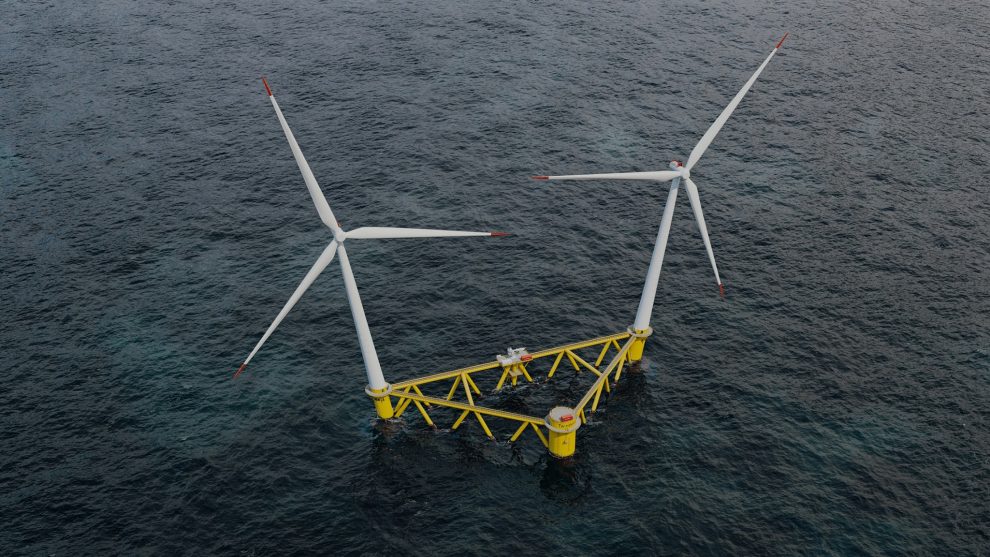UP TO 5,300 new jobs and up to £1.4 billion could be generated for the UK economy by galvanising the supply chain and infrastructure opportunities arising from the development of new floating wind farms.The independent study, The Celtic Sea Blueprint, conducted by Lumen Energy & Environment, looked at the minimum requirements needed to deliver the first three projects outlined by The Crown Estate in December.
It also examined the gaps, such as ports deep enough for handling the giant turbines, vessels to service the sites, and export cables to transport electricity to land.
Addressing these gaps will be critical to establishing these first windfarms, and, with a further pipeline of windfarms expected in the region and rising global demand, the opportunities for ports, manufacturers and the wider supply chain could be far greater.
Action is required now, locally and nationally, to capture the opportunities associated with this fast, growing, innovative new technology. The first three floating wind farms, which will be able to generate up to 4.5GW of electricity – enough to power more than four million homes, will be some of the largest in the world.
And, as the first in the UK outside of Scotland, it marks a new phase for offshore wind in England and Wales.
The South West/Wales has the potential to be at the forefront of driving this development with opportunities from port infrastructure to significant SME support across the supply chain.
In particular, the research highlighted opportunities for the region, from assembling the large floating platforms needed to house the turbines to building on the existing local high-skilled welding and concrete expertise and local suppliers.
It highlighted opportunities for local ports across the region from the assembly, transport, and storage of parts during the construction and life-cycle of the sites.
At the same time, the region’s strong shipping expertise could also benefit during the development stages.
Gus Jaspert, Managing Director of Marine at The Crown Estate, said: “Floating wind is an incredibly exciting opportunity for the region and the nation. It will boost clean electricity generation by unlocking the deeper waters of the Celtic Sea not previously accessible by fixed turbines and providing greater access to wind blowing from the west.
“The benefits, though, are even more wide-ranging. They open up wider local and national opportunities for manufacturers and the supply chain, from cables to platform construction to port development, creating thousands of new jobs and skills.
“But there are also gaps in the market.
“If the UK is to make the most of the economic and environmental opportunities from the transition to renewable energy, we must be on the front foot. We must act now to develop the supply chain capability, skills and infrastructure needed to establish these windfarms and future floating windfarms in the Celtic Sea and elsewhere.
“We want to work with the industry, trade organisations, local communities and across governments to ensure we are harnessing all the available opportunities and supporting the UK in continuing to accelerate its world-leading position in offshore wind.”
RenewableUK’s Chief Executive Dan McGrail, Co-Chair of the Floating Offshore Wind Taskforce, said: “The Celtic Sea Blueprint shows that floating wind can deliver immense industrial growth.
“Some of the world’s biggest floating wind farms will be built in the Celtic Sea, with turbines twice as tall as Blackpool Tower, platforms the size of football pitches and hundreds of kilometres of hi-tech cables.”
Jess Hooper, Director for RenewableUK Cymru, added: “Manufacturing is part of the Welsh national story. We have a proud industrial work heritage, a skilled manufacturing base, and strong links with the universities and colleges that feed into this industry.
“Retaining, upskilling and transitioning our local workforce towards offshore wind is the biggest opportunity to provide high-quality employment for decades to come.
“Only by developing our port capabilities in South Wales can we do this.
“Our ports are paramount in attracting the right anchor companies to safeguard against project delivery bottlenecks and develop our local supply chain capabilities.
“Investment in the region now is critical to delivering on that 4.5GW of offshore wind at the scale and pace required to meet our net zero targets.”
The Crown Estate is now focused on bringing key parties together to create an action plan for developing supply chain and infrastructure capabilities in the region and across the UK.
The Crown Estate has invested in extensive spatial planning and surveys to map the environmental and physical properties of the wind farm sites, conducted environmental assessments and begun work with the Electricity System Operator on connections to the UK’s energy grid up front in the process.
It will also introduce a series of contractual commitments for developers to help drive positive social and environmental impacts for the region focused on jobs, skills and training, environmental benefits and working with local communities.
The formal tender process for the floating wind farms starts at the end of the month.
Offshore wind could power economic growth















